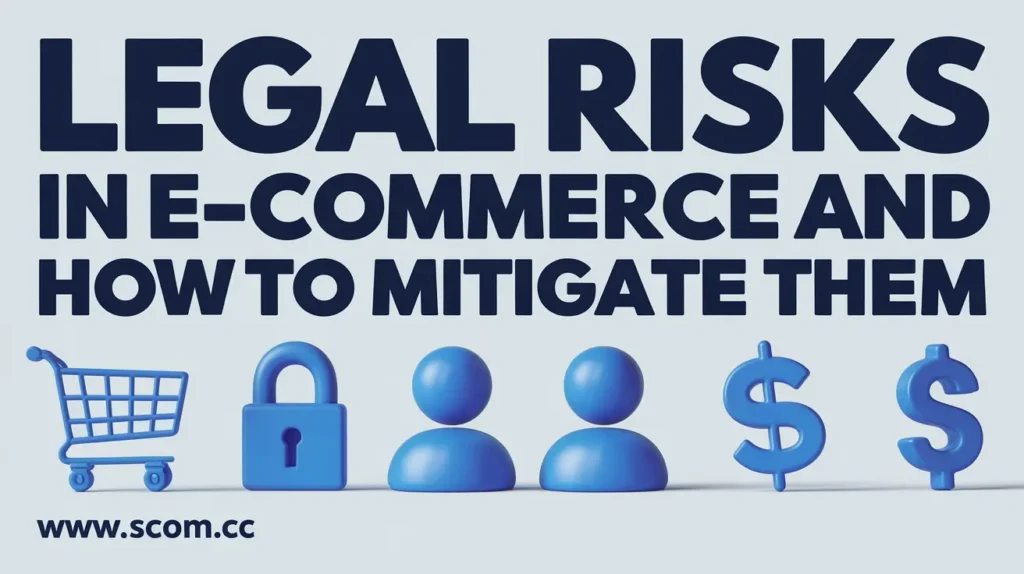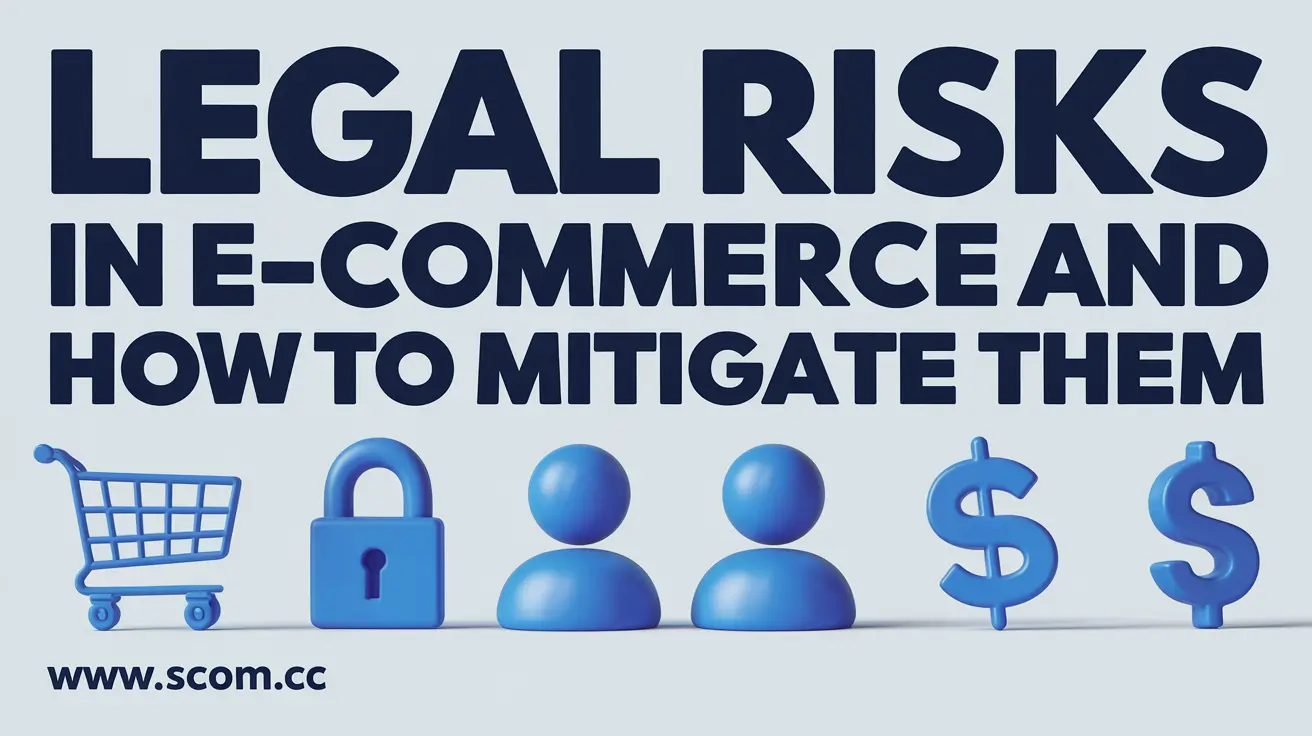Legal Risks in E-commerce and How to Mitigate Them

- Legal Risks in E-commerce and How to Mitigate Them
- Understanding Legal Risks in E-commerce
- Strategies for Mitigating Legal Risks in E-commerce
- Case Studies of E-commerce Legal Risk Management
- Summary Table
-
FAQ
- What are common legal risks in e-commerce?
- How can businesses mitigate consumer protection risks?
- What steps should be taken to protect data privacy and security?
- How can businesses safeguard their intellectual property in e-commerce?
- What should be included in e-commerce contracts to minimize legal risks?
- How can businesses ensure compliance with e-commerce regulations?
- Can you provide examples of companies successfully managing e-commerce legal risks?
Legal Risks in E-commerce and How to Mitigate Them
E-commerce has revolutionized the way businesses operate and consumers shop. While it offers significant opportunities for growth and reach, it also introduces a range of legal risks that businesses must navigate. These risks can impact various aspects of an e-commerce operation, from consumer protection and data privacy to intellectual property and contractual obligations. This article explores common legal risks in e-commerce and provides strategies for mitigating them.
Understanding Legal Risks in E-commerce
Legal risks in e-commerce refer to potential legal issues that businesses may encounter in their online operations. These risks can arise from various sources, including regulatory compliance, consumer protection laws, data privacy concerns, and intellectual property disputes. Understanding these risks is crucial for developing effective mitigation strategies.
Consumer Protection Issues
Consumer protection laws are designed to ensure that businesses treat consumers fairly and provide accurate information about products and services. Common consumer protection issues in e-commerce include:
- Misleading Advertising: Claims that are deceptive or false, leading to consumer complaints or regulatory action.
- Product Safety: Ensuring products meet safety standards and do not pose risks to consumers.
- Returns and Refunds: Adhering to legal requirements for product returns, refunds, and exchanges.
Data Privacy and Security
Data privacy and security are critical in e-commerce, as businesses collect and process sensitive customer information. Risks include:
- Data Breaches: Unauthorized access to customer data due to security vulnerabilities or cyberattacks.
- Non-Compliance: Failure to comply with data protection regulations such as the General Data Protection Regulation (GDPR) or the California Consumer Privacy Act (CCPA).
- Data Misuse: Inappropriate use of customer data for marketing or other purposes without proper consent.
Intellectual Property Disputes
Intellectual property (IP) risks involve the protection and enforcement of IP rights such as trademarks, copyrights, and patents. Risks include:
- Trademark Infringement: Unauthorized use of a trademark that may cause confusion with another brand.
- Copyright Infringement: Using copyrighted material without permission, such as images, text, or software.
- Patent Infringement: Violating patents held by others, particularly in the development of e-commerce technologies.
Contractual Obligations
E-commerce businesses enter into various contracts with suppliers, customers, and partners. Risks related to contractual obligations include:
- Breach of Contract: Failure to fulfill contractual terms, leading to disputes and potential legal action.
- Unclear Terms: Ambiguities or poorly drafted contract terms that can result in misunderstandings or disputes.
- Enforcement Issues: Challenges in enforcing contracts, particularly when dealing with international parties.
Regulatory Compliance
E-commerce businesses must comply with a range of regulations and laws that can vary by jurisdiction. Risks include:
- Tax Compliance: Ensuring compliance with sales tax and value-added tax (VAT) regulations.
- Consumer Rights: Adhering to laws related to consumer rights, including online sales regulations.
- Cross-Border Regulations: Navigating regulatory requirements when operating in multiple countries.
Strategies for Mitigating Legal Risks in E-commerce
Developing a Robust Legal Framework
Establishing a comprehensive legal framework is essential for managing e-commerce risks. Key components include:
- Terms and Conditions: Create clear and detailed terms and conditions that outline the rights and obligations of both parties.
- Privacy Policy: Develop a privacy policy that complies with data protection regulations and explains how customer data is collected, used, and protected.
- Return and Refund Policy: Establish a policy for returns and refunds that aligns with legal requirements and customer expectations.
Ensuring Data Privacy and Security
Protecting customer data is crucial for maintaining trust and compliance. Strategies include:
- Data Encryption: Use encryption to protect sensitive data during transmission and storage.
- Access Controls: Implement access controls to restrict unauthorized access to customer data.
- Regular Audits: Conduct regular security audits to identify and address vulnerabilities.
- Compliance with Regulations: Stay informed about data protection laws and ensure compliance with regulations such as GDPR and CCPA.
Protecting Intellectual Property
Safeguarding intellectual property helps prevent disputes and protect your brand. Key actions include:
- Registering IP Rights: Register trademarks, copyrights, and patents to establish legal protection.
- Monitoring Infringements: Monitor for potential infringements and take action to enforce IP rights when necessary.
- Using IP Notices: Include IP notices on your website and marketing materials to deter unauthorized use.
Drafting Clear and Comprehensive Contracts
Well-drafted contracts are essential for managing legal obligations and minimizing disputes. Key practices include:
- Detailing Terms: Clearly define terms related to performance, delivery, payment, and other key aspects.
- Including Dispute Resolution Clauses: Include clauses that outline how disputes will be resolved, such as through mediation or arbitration.
- Reviewing Contracts Regularly: Regularly review and update contracts to ensure they remain relevant and enforceable.
Staying Compliant with Regulations
Compliance with regulations helps avoid legal issues and penalties. Strategies include:
- Monitoring Regulatory Changes: Stay informed about changes in laws and regulations that impact e-commerce operations.
- Consulting Legal Experts: Seek advice from legal experts to ensure compliance with complex regulatory requirements.
- Implementing Compliance Programs: Develop and implement programs to ensure ongoing compliance with relevant laws and regulations.
Case Studies of E-commerce Legal Risk Management
Retailer X’s Data Privacy Strategy
Retailer X faced data privacy concerns related to customer information. The company implemented a comprehensive data privacy policy, encrypted customer data, and conducted regular security audits. By staying compliant with GDPR, Retailer X successfully avoided data breaches and built customer trust.
E-commerce Platform Y’s IP Protection
E-commerce Platform Y encountered issues with trademark infringement. The company registered its trademarks, monitored for potential infringements, and took legal action against unauthorized use. This proactive approach helped protect the platform’s brand and prevent potential disputes.
Marketplace Z’s Contractual Risk Management
Marketplace Z faced challenges with supplier contracts, including unclear terms and breaches. The company revised its contract templates to include detailed terms and dispute resolution clauses. By clearly defining obligations and processes, Marketplace Z reduced the risk of contractual disputes.
Summary Table
| Risk Area | Key Points |
|---|---|
| Consumer Protection | Ensure accurate advertising, product safety, and compliant return/refund policies. |
| Data Privacy and Security | Protect data with encryption, access controls, regular audits, and compliance with regulations. |
| Intellectual Property | Register IP rights, monitor for infringements, and use IP notices. |
| Contractual Obligations | Draft clear contracts, include dispute resolution clauses, and review contracts regularly. |
| Regulatory Compliance | Stay informed about regulatory changes, consult legal experts, and implement compliance programs. |
FAQ
What are common legal risks in e-commerce?
Common legal risks in e-commerce include consumer protection issues, data privacy and security concerns, intellectual property disputes, contractual obligations, and regulatory compliance challenges.
How can businesses mitigate consumer protection risks?
Businesses can mitigate consumer protection risks by ensuring accurate advertising, adhering to product safety standards, and developing clear return and refund policies.
What steps should be taken to protect data privacy and security?
To protect data privacy and security, businesses should use encryption, implement access controls, conduct regular security audits, and comply with data protection regulations like GDPR and CCPA.
How can businesses safeguard their intellectual property in e-commerce?
Businesses can safeguard intellectual property by registering trademarks, copyrights, and patents, monitoring for infringements, and using IP notices on their websites and marketing materials.
What should be included in e-commerce contracts to minimize legal risks?
E-commerce contracts should include detailed terms related to performance, delivery, payment, and dispute resolution clauses. Regularly reviewing and updating contracts is also important.
How can businesses ensure compliance with e-commerce regulations?
Businesses can ensure compliance by monitoring regulatory changes, consulting legal experts, and implementing compliance programs to adhere to relevant laws and regulations.
Can you provide examples of companies successfully managing e-commerce legal risks?
Examples include Retailer X’s implementation of a data privacy strategy, E-commerce Platform Y’s IP protection measures, and Marketplace Z’s improved contractual risk management practices.

If you enjoyed this article and found it valuable, we encourage you to explore our news and valuable information section, where you'll find more relevant and up-to-date content that may pique your interest. Additionally, if you are seeking advice or need guidance on a specific topic, we suggest visiting our services section. There, you will find a variety of options designed to assist and support you in addressing your needs. Feel free to check out both sections to get the information and assistance that best suits your requirements.

Leave a Reply